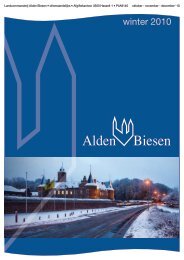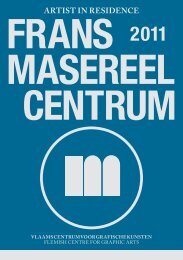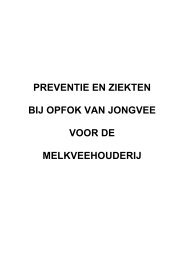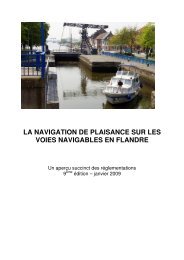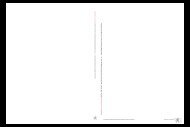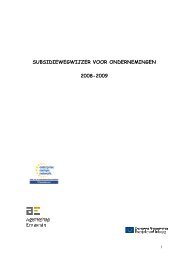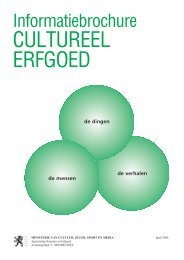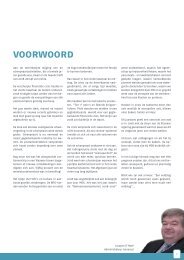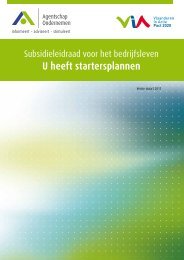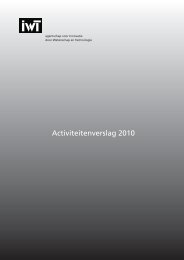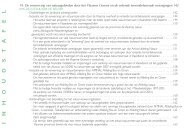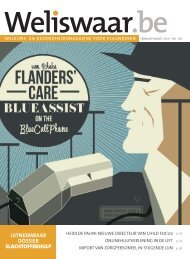Acknowledgements Book of abstracts - Publicaties - Vlaanderen.be
Acknowledgements Book of abstracts - Publicaties - Vlaanderen.be
Acknowledgements Book of abstracts - Publicaties - Vlaanderen.be
You also want an ePaper? Increase the reach of your titles
YUMPU automatically turns print PDFs into web optimized ePapers that Google loves.
Marc Pierard presents Workshop paper 3<br />
In workshop 1: Welfare <strong>of</strong> riding horses<br />
Friday, 12 Septem<strong>be</strong>r 2008 from 14h00-15h45 in the Aula chaired by Frank Öd<strong>be</strong>rg<br />
178<br />
Workshop paper 3<br />
IMPLEMENTATION OF WELFARE SCIENCE INTO PRACTICE<br />
M. Pierard 1 , F.O. Öd<strong>be</strong>rg 2<br />
1 Geelstraat 30, Sint-Truiden, Belgium<br />
2 Department <strong>of</strong> Animal Nutrition, Genetics and Ethology, Faculty <strong>of</strong> Veterinary Sciences, Ghent University,<br />
Merel<strong>be</strong>ke, Belgium<br />
Scientific evidence clearly demonstrates that current management systems for horses are at least<br />
suboptimal and cause for welfare concerns. Fundamental change depends on 3 parties involved:<br />
government who regulates and supports, sector organisations who educate and regulate and, <strong>of</strong><br />
course, the people in the field who have to implement improved techniques. Due to the diversity<br />
within the horse world and the fact that more applied research is necessary to refine new systems,<br />
legislation will only <strong>be</strong> able to set minimum standards and provide leverage to convince people to<br />
change. Equine organisations will have to incorporate existing and ongoing scientific knowledge in<br />
their regulations and in the education programmes for trainers, <strong>of</strong>ficials and riders. They shouldn’t<br />
wait for new legislation, but they should start immediately. Besides positive effects on welfare <strong>of</strong><br />
horses and prevention <strong>of</strong> injuries to horse and rider/handler, it will <strong>be</strong> <strong>be</strong>neficial for the<br />
performances <strong>of</strong> the horses and for the economic viability <strong>of</strong> the horse sector.<br />
A study screening the horse industry leading to practical checklists is fundamental in order to<br />
monitor that sector in an efficient and credible way in the future (Vernaillen, s.d.). Ideally speaking,<br />
the industry itself should take her future in her own hands and warrant for quality <strong>be</strong>fore the<br />
legislator imposes his rules. A recent Australian study demonstrated that a vast majority <strong>of</strong> coaches<br />
and trainers possess insufficient knowledge <strong>of</strong> basic principles <strong>of</strong> learning theory (Warren-Smith &<br />
McGreevy, 2008). Formal training and public information should <strong>be</strong> more evidence-based and<br />
traditional methods have to <strong>be</strong> objectively verified and optimized. Science can and should <strong>be</strong><br />
integrated in daily practice. More extensive, constructive cooperation <strong>be</strong>tween scientists and<br />
practitioners would <strong>be</strong> mutually <strong>be</strong>neficial and would certainly make daily practice more horse<br />
friendly.<br />
Contact information: Marc Pierard or email pierardmarc@hotmail.com or frank.od<strong>be</strong>rg@ugent.<strong>be</strong><br />
Complete address: Geelstraat 30, Sint-Truiden, Belgium<br />
Species: Horse



